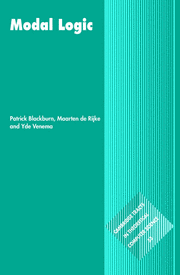Book contents
- Frontmatter
- Dedication
- Contents
- Preface
- 1 Basic Concepts
- 2 Models
- 3 Frames
- 4 Completeness
- 5 Algebras and General Frames
- 6 Computability and Complexity
- 7 Extended Modal Logic
- Appendix A A Logical Toolkit
- Appendix B An Algebraic Toolkit
- Appendix C A Computational Toolkit
- Appendix D A Guide to the Literature
- References
- List of Notation
- Index
Preface
Published online by Cambridge University Press: 05 July 2014
- Frontmatter
- Dedication
- Contents
- Preface
- 1 Basic Concepts
- 2 Models
- 3 Frames
- 4 Completeness
- 5 Algebras and General Frames
- 6 Computability and Complexity
- 7 Extended Modal Logic
- Appendix A A Logical Toolkit
- Appendix B An Algebraic Toolkit
- Appendix C A Computational Toolkit
- Appendix D A Guide to the Literature
- References
- List of Notation
- Index
Summary
Ask three modal logicians what modal logic is, and you are likely to get at least three different answers. The authors of this book are no exception, so we will not try to start off with a neat definition. Nonetheless, a number of general ideas guide our thinking about the subject, and we will present the most important right away as a series of three slogans. These are meant to be read now, and, perhaps more importantly, referred back to occasionally; doing so will help you obtain a firm grasp of the ideas and intuitions that have shaped this book. Following the slogans we will discuss the aims and content of the book in more detail.
Our first slogan is the simplest and most fundamental. It sets the basic theme on which the others elaborate:
Slogan 1: Modal languages are simple yet expressive languages for talking about relational structures.
In this book we will be examining various propositional modal languages: that is, the familiar language of propositional logic augmented by a collection of modal operators. Like the familiar boolean connectives (¬ ∧, ∨, →, ⊥, and ⊤), modal operators do not bind variables. Thus, as far as syntax is concerned, we will be working with the simplest non-trivial languages imaginable.
But in spite of their simplicity, propositional modal languages turn out to be an excellent way of talking about relational structures, and this book is essentially an attempt to map out some of the ramifications of this.
- Type
- Chapter
- Information
- Modal Logic , pp. xi - xxiiPublisher: Cambridge University PressPrint publication year: 2001



